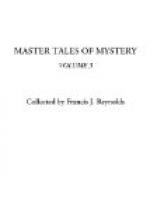“It is in one way a pity,” I murmured. “For monsieur is without doubt a species of born birdman. But any one would make a parallel renunciation to stand in his shoes.”
“You are dangerously romantic, Monsieur Jules,” said mademoiselle. “If it were not your supreme virtue, it would be your principal fault.”
“Too true, mademoiselle,” I replied. “But it cannot be denied that I am at the same time a very pretty flier.”
It was not until some time after they had departed that I found upon the table among my medicines two envelopes. One, small and dainty, was a formal announcement of the fiancailles of Miss Warren and the young Monsieur Power. The other, long and of an official shape, contained—ah, what do you guess?
It was a draft of the incorporation of a company to control my flying schools, and realize my dream of the all-steel monoplane of stability positively automatic. At the head I read the names of Messieurs Warren and Power as guarantors. There remain only blank spaces requiring my signature.
Bien alors! In a few days more I shall be able to hold a pen!
CHEAP
BY MARJORIE L.C. PICKTHALL
Ransome said that you might pick up specimens of all the unprettiest afflictions of body and soul in Herares ten years ago. He also said that when he saw any particularly miserable bit of human wreckage, white or brown, adrift on the languid tides of life about the jetty, he always said without further inquiry, “It’s Henkel’s house you’re looking for. Turn to the left, and keep on turning to the left. And if God knew what went on under these trees. He’d have mercy on you.”
The house was the last house on the last road of the town. You don’t find it now, for no one would live in it after Henkel; and in a season or two the forest had swamped it as the sea swamps a child’s boat on the beach. It was a white house in a garden, and after rain the scent of vanilla and stephanotis rose round it like a fog. The fever rose round it like a fog, too, and that’s why Henkel got it so cheap. No fever touched him. He lived there alone with a lot of servants—Indians. And they were all wrecks, Ransome said, broken down from accident or disease—wrecks that no one else would employ. He got them very cheap. When they died he got more.
Henkel was a large, soft, yellowish man. Ransome said, “I don’t mind a man being large and yellowish, or even soft in reason; but when he shines, too, I draw the line.” Henkel had thick hands with bent fingers, and large, brown eyes. He was a Hollander, and in that place he stood apart. For he didn’t drink, or gamble, or fight, or even buy rubber. He was just a large, peaceful person who bought things cheap.
He was very clever. He always knew the precise moment, the outmost low-water mark, of a bargain. His house was full of things he’d bought cheap from wrecked companies or dying men, from the mahogany logs in the patio to the coils of telegraph wire in the loft. His clothes never fitted him, for they belonged to men whom the fever had met on the way up the Mazzaron, and who had therefore no further use for clothes. The only things for which Henkel ever paid a fair price were butterflies.




